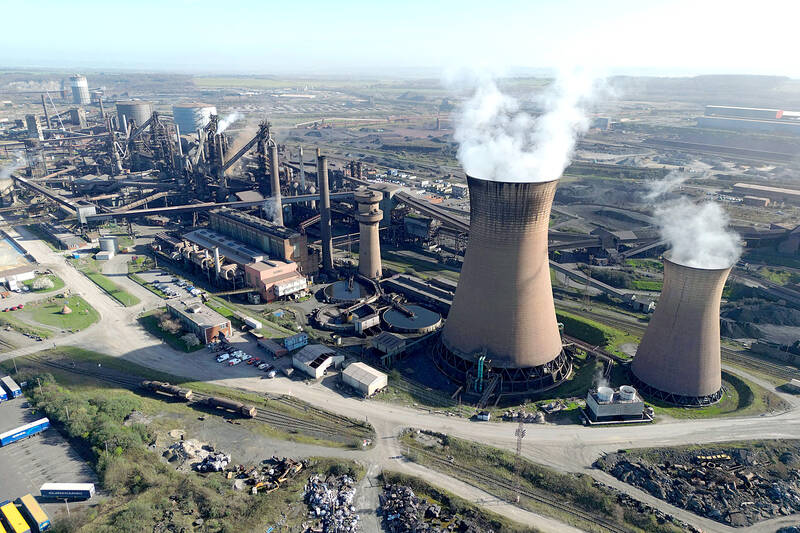China is no longer welcome in Britain’s steel sector after the government had to pass emergency legislation on Saturday to ensure control of Chinese-owned British Steel, British Secretary of State for Business and Trade Jonathan Reynolds said on Sunday.
Reynolds said the refusal of China’s Jingye Group (敬業集團) to accept a roughly 500 million pound (US$654 million) government aid package last week to stop irrevocable damage to blast furnaces left the government with no alternative to intervening directly.
Against a backdrop of global overcapacity in much of the steel industry and challenges from US tariffs, Jingye wanted to import steel from China for further processing in Britain, Reynolds said in an interview with Sky News.

Photo: Dominic Lipinski, Reuters
But the closure of blast furnaces at the British Steel plant in Scunthorpe — which need to be constantly fuelled and are losing 700,000 pounds a day — would have left Britain as the only major economy unable to produce so-called virgin steel from iron ore, coke and other inputs.
Previous British governments had been “naive” to allow Chinese companies to be involved in the steel sector, Reynolds said.
Large industrial companies such as Jingye Group had direct links to the Chinese Communist Party and China’s government would understand why Jingye’s proposal was unacceptable to Britain, he added.
“You’ve got to be clear about what is the sort of sector where we can promote, cooperate; and ones, frankly, where we can’t. I wouldn’t personally bring a Chinese company into our steel sector. I think steel is a very sensitive area,” he said.
Jingye bought British Steel from the government in 2020 after the company became insolvent.
Since coming to office last year, the Labour government has stepped up engagement with China after tensions under previous Conservative governments over human rights, Hong Kong and latterly restrictions on investment over security concerns.
Reynolds said he viewed other sectors such as car making, life sciences and agricultural products as less sensitive areas for Chinese investment.
British Chancellor of the Exchequer Rachel Reeves visited Beijing in January and Chinese Minister of Foreign Affairs Wang Yi (王毅) visited London in February to revive talks that were paused for over six years.

TAKING STOCK: A Taiwanese cookware firm in Vietnam urged customers to assess inventory or place orders early so shipments can reach the US while tariffs are paused Taiwanese businesses in Vietnam are exploring alternatives after the White House imposed a 46 percent import duty on Vietnamese goods, following US President Donald Trump’s announcement of “reciprocal” tariffs on the US’ trading partners. Lo Shih-liang (羅世良), chairman of Brico Industry Co (裕茂工業), a Taiwanese company that manufactures cast iron cookware and stove components in Vietnam, said that more than 40 percent of his business was tied to the US market, describing the constant US policy shifts as an emotional roller coaster. “I work during the day and stay up all night watching the news. I’ve been following US news until 3am

Six years ago, LVMH’s billionaire CEO Bernard Arnault and US President Donald Trump cut the blue ribbon on a factory in rural Texas that would make designer handbags for Louis Vuitton, one of the world’s best-known luxury brands. However, since the high-profile opening, the factory has faced a host of problems limiting production, 11 former Louis Vuitton employees said. The site has consistently ranked among the worst-performing for Louis Vuitton globally, “significantly” underperforming other facilities, said three former Louis Vuitton workers and a senior industry source, who cited internal rankings shared with staff. The plant’s problems — which have not

TARIFF CONCERNS: The chipmaker cited global uncertainty from US tariffs and a weakening economic outlook, but said its Singapore expansion remains on track Vanguard International Semiconductor Corp (世界先進), a foundry service provider specializing in producing power management and display driver chips, yesterday withdrew its full-year revenue projection of moderate growth for this year, as escalating US tariff tensions raised uncertainty and concern about a potential economic recession. The Hsinchu-based chipmaker in February said revenues this year would grow mildly from last year based on improving supply chain inventory levels and market demand. At the time, it also anticipated gradual quarter revenue growth. However, the US’ sweeping tariff policy has upended the industry’s supply chains and weakened economic prospects for the world economy, it said. “Now

COLLABORATION: Given Taiwan’s key position in global supply chains, the US firm is discussing strategies with local partners and clients to deal with global uncertainties Advanced Micro Devices Inc (AMD) yesterday said it is meeting with local ecosystem partners, including Taiwan Semiconductor Manufacturing Co (TSMC, 台積電), to discuss strategies, including long-term manufacturing, to navigate uncertainties such as US tariffs, as Taiwan occupies an important position in global supply chains. AMD chief executive officer Lisa Su (蘇姿丰) told reporters that Taiwan is an important part of the chip designer’s ecosystem and she is discussing with partners and customers in Taiwan to forge strong collaborations on different areas during this critical period. AMD has just become the first artificial-intelligence (AI) server chip customer of TSMC to utilize its advanced